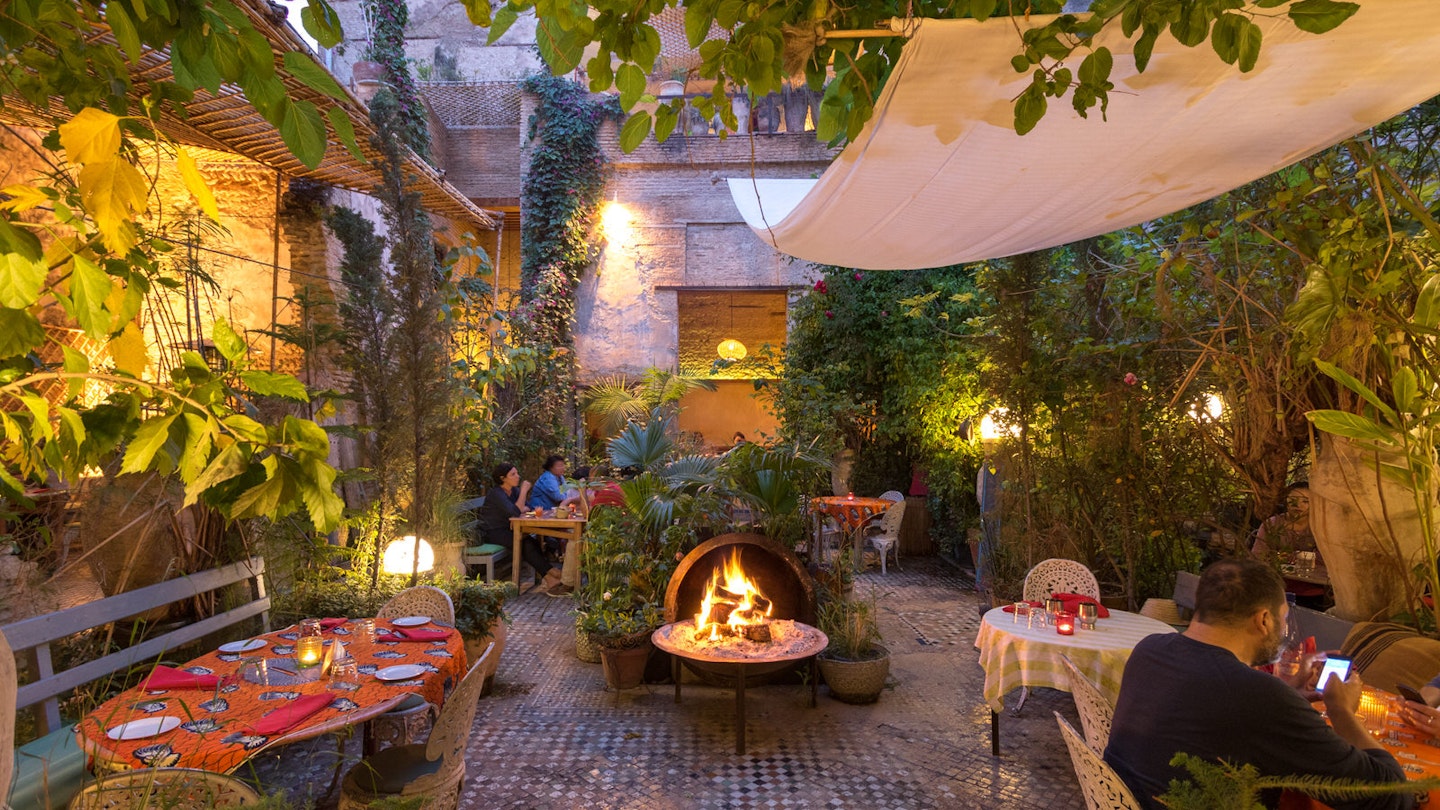Moroccan cuisine is a cultural melting pot, and Fassi flavours originated in the fanadiq (ancient inns used by travelling merchants), where numerous nationalities crossed paths. The Berber influence is found in staples like couscous, while Arabs contributed dried fruit and spices, and the French established a café culture. Recipes vary by region, but some of Morocco’s most unique dishes hail from Fez.
Best for light bites: Café Clock
Set in the heart of the medina, Fez institution Café Clock spreads over two dars (traditional townhouses with internal courtyards). It’s the perfect place to take a break while sightseeing with nus nus – half coffee, half milk – and a bite from the eclectic all-day menu, perhaps shakshuka (a Berber-style omelette), a hearty harira soup, or the famous camel burger. It’s vegetarian friendly as well. Wash it down with a luisa (lemon verbena) tea or a date milkshake.
Best for Moroccan tapas and Fassi classics: The Ruined Garden
Set in the romantic remnants of a ruined riad, The Ruined Garden serves Moroccan ‘tapas’ for lunch, such as sardines in chermoula (a blend of garlic, paprika, cumin, olive oil, and lemon juice) with a polenta batter, and makouda, spiced battered potato cakes. For dinner, enjoy a la carte selections or special-occasion dishes like slow-roasted mechoui lamb, Sephardic chicken, and the quintessential Fassi dish, pigeon b’stilla, made with boneless braised pigeon wrapped in paper-thin warka pastry, baked and dusted with icing sugar and cinnamon.
Best for home-cooked dishes: Dar Hatim
Many believe that the best Moroccan food is served at home. Dar Hatim offers that homey experience in a tucked-away corner of the Medina, where a family has turned their beautifully tiled living room and courtyard into a popular restaurant. Here, you can choose from four different three-course set menus, featuring Moroccan salads, freshly baked bread, and succulent olives, followed by tagines, couscous, and pastilla.
Best for fine-dining fusion: Nur
Raised between the Basque Country, the Atlas Mountains, and Fez, chef Najat Kaanache has worked at fine dining establishments globally, including Noma and El Bulli, before opening Nur (meaning ‘light’ in Arabic) in an intimate riad-turned-restaurant. The six to 10-course, seasonally inspired tasting menu varies daily, reflecting local market finds and creative dishes such as sashimi with zaalouk and chicken paired with a Mexican mole sauce.
Best for traditional cooking: The Clock Kitchen
The Clock Kitchen at Café Clock offers hands-on cooking experiences where local chefs guide you in creating authentic Moroccan meals. You’ll collectively decide on the menu, shop for fresh produce at the local souq, and then prepare a three-course feast, learning about Morocco’s diverse flavours and culture in the process.
Best for modern Moroccan menus: The Courtyard Kitchen at Dar Namir
To explore contemporary Moroccan cooking, consider a full-day private class with Tara Stevens, author of the Clock Book cookbook, at The Courtyard Kitchen at Dar Namir. It’s an engaging experience where you’ll delve into herbs, spices, and traditional cooking techniques while preparing five sophisticated dishes for enjoyment afterwards on the roof terrace.
Best for creative cooking classes: Ruined Garden Restaurant
The Ruined Garden has launched cooking workshops covering various aspects of Moroccan cuisine. Topics include bread making, where you can learn to craft khobz (flatbread), malawi (Moroccan pancakes), and more. Other classes focus on making traditional salads, sweet treats, and tea preparation.
Best for creative foodie tours: Plan-it Morocco
Under the guidance of Plan-it Morocco, you’ll learn how to cook in a traditional dar with three generations of a family. Hone your haggling skills at the souq, learn to make traditional bread, and prepare seasonal salads and tagines before enjoying a meal together.
Tasting trails in Fez and beyond
Plan-it Morocco offers innovative tasting trails exploring the medina’s narrow alleyways with a food expert. Sample traditional street foods, learn about Fassi specialities, and discover the vibrant culinary scene. Further afield, the mountains of the Middle Atlas are home to fine produce, boutique farms, and wine makers innovating traditional Moroccan flavors.




